I am currently doing the Introduction to Video Game Creation course from XAMK, and as part of the course there is a requirement to prepare a "one sheet" for a game idea, as well as a character sheet. I can't say I am very imaginative in terms of characters, but since I recently created a potential mascot for Support from Hel, I thought why not leverage that and even go in full throttle into this idea?
Below are a lot of my thoughts on the possible game. This is in no way a design document or anything close to it, and it would probably require quite a few changes, if the concept becomes a real game. But I think it's the closest I've gotten to a really fleshed-out and thought-out game idea thus far. Maybe I will even try to make a prototype of it as part of the course. This also means, that screenshots you will see in this article are not from the actual game, but from other games, that inspire it.
There is a lot of text here, obviously, so as TLDR version, here's a one sheet:
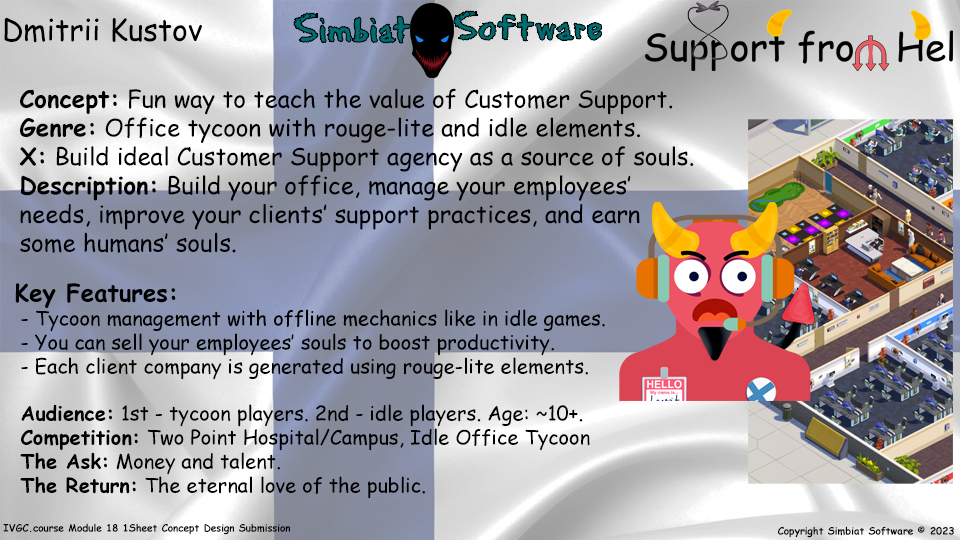
Backstory
Meet Levit. He is one of the demons assigned to monitor Finland. One seemingly uneventful day, as is common for him, he starts hearing constant "perkele" (Finnish curse word, a more general meaning is "evil spirit", a narrower one is "devil", or it can be treated as "oh, damn"), repeating over and over again. Demons generally need to listen to those, in order to react, in case this is an actual call, and something is planning to offer their soul to them. So, it's like an alert or notification on your phone for them.
This time is different, because there is lots of cursing, even more than you get during sport events. It sounds as if a bunch of people are talking in cursing. Which still does happen sometimes, but normally for just short bursts, not for several hours straight. And, you see, Levit enjoys taking naps midday, since there is not much work for him on most days, after all "the happiest country in the world" and the stereotypical Finn's desire to self-isolate. That cursing is not allowing him to nap.
He takes a cup of hellishly hot coffee (to help him stay focused) and warps to the location where the curses are coming from. While also wearing his pajamas and fluffy slippers. He finds himself in a small, rented office space with 5 (probably, more on that later) people in there. They do not seem to notice him, though, while being focused on their computer screens and, yes, cursing with every word.
Levit yells to make them notice him. When the people look at him, he asks, what the hell was going on, but most of them just return to their work. Only one person (probably CEO or something, no name for him yet), walks up to him asking:
- Who in tarnation are you?
- Ah… If my horns and tail did not give it away, I am a devil.
- Like, Satan?
- No, that one is "Devil" with the capital "D", I am much lower in ranks. Which does not matter. What's with all the cursing?
- What cursing?
Levit pointed at the working people, saying:
- This one. I do not think I hear a single non-cursing word from them. And at least one of them seems to be on-call even.
- Well, we are Customer Support, it's difficult to get by without cursing, considering all the crazies coming by. It could be better if we were supporting only 1 product or something, but I decided to try creating an agency and provide the service to other companies.
- Why?
- Why what?
- Why everything! Why an agency and why the cursing?
- I got fed up with companies providing poor or even no customer support. That's just not right. We pay for services and products, and if we have a question or even an issue, we want to get some assistance. Politely, promptly, clearly, on-point. Thought, I could create my own team of supporters and provide the service, but I got contracts only with 3 really small companies, barely hired 3 supporters…
- I do not need your whole life story here. I am obliged to react to such heavy cursing, so what the hell?
- Those companies' products are… Bad. So, we get a lot of complaints. At first it was tolerable, but at some point, your emotional energies just start running out. The guys are just trying to cope with all that negativity now.
- Pfff. That should not be that difficult, come on. Two of them are talking through chat even. And if it's just 3 products, I'm sure there is a very limited number of issues, that can happen.
- You think so, smarty-pants? Wanna try this gig on for yourself?
- What do you mean?
- If you think you can manage the company so that supporters would not have to curse so often, I will gladly let you take over the company and become a regular supporter myself. At least, de facto: I won't sign the company over to you.
- But I won't get anything from this.
- Well… Considering all the negativity which comes with Customer Support, I am sure you can find a couple of people, who may be willing to sell their soul to you just to withstand it all.
- Hm… Would not mind that, that's for sure. But seems like a win-win for you personally.
- If you will be able to expand the agency and hold… Let's say 13 offices and 666 business contracts for a year – you can have my own soul and the whole company.
- Just 1 year?
- Yes, just 1.
- Way shorter turn around that usual for me. Deal.
Levit summons a contract, writes down the deal's details, both parties sign it, and now it's time for Levit to get to work.
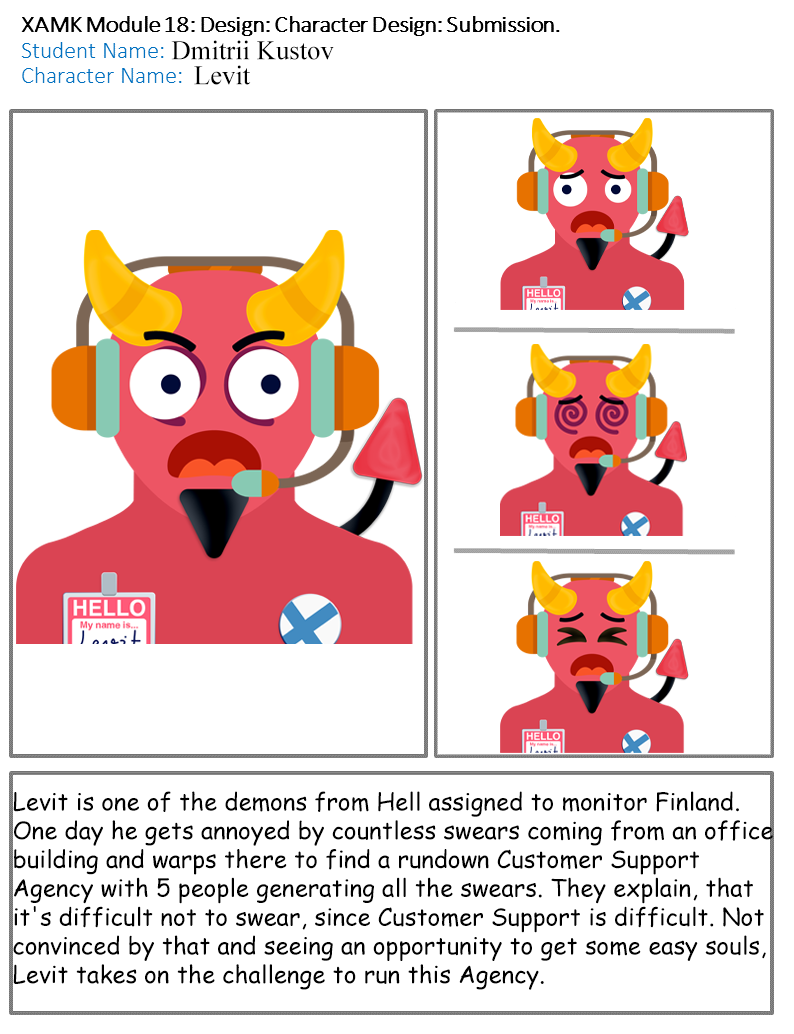
Build me an office
The core of the gameplay is free office building like in Theme Hospital or its more modern interpretation – Two Point Hospital (or Campus), TPH in short further in text. So, you have floor, which is limited in size and shape, and you build rooms in it, which you then populate with suitable furniture and accessories. What is different is the way office expansion is done.
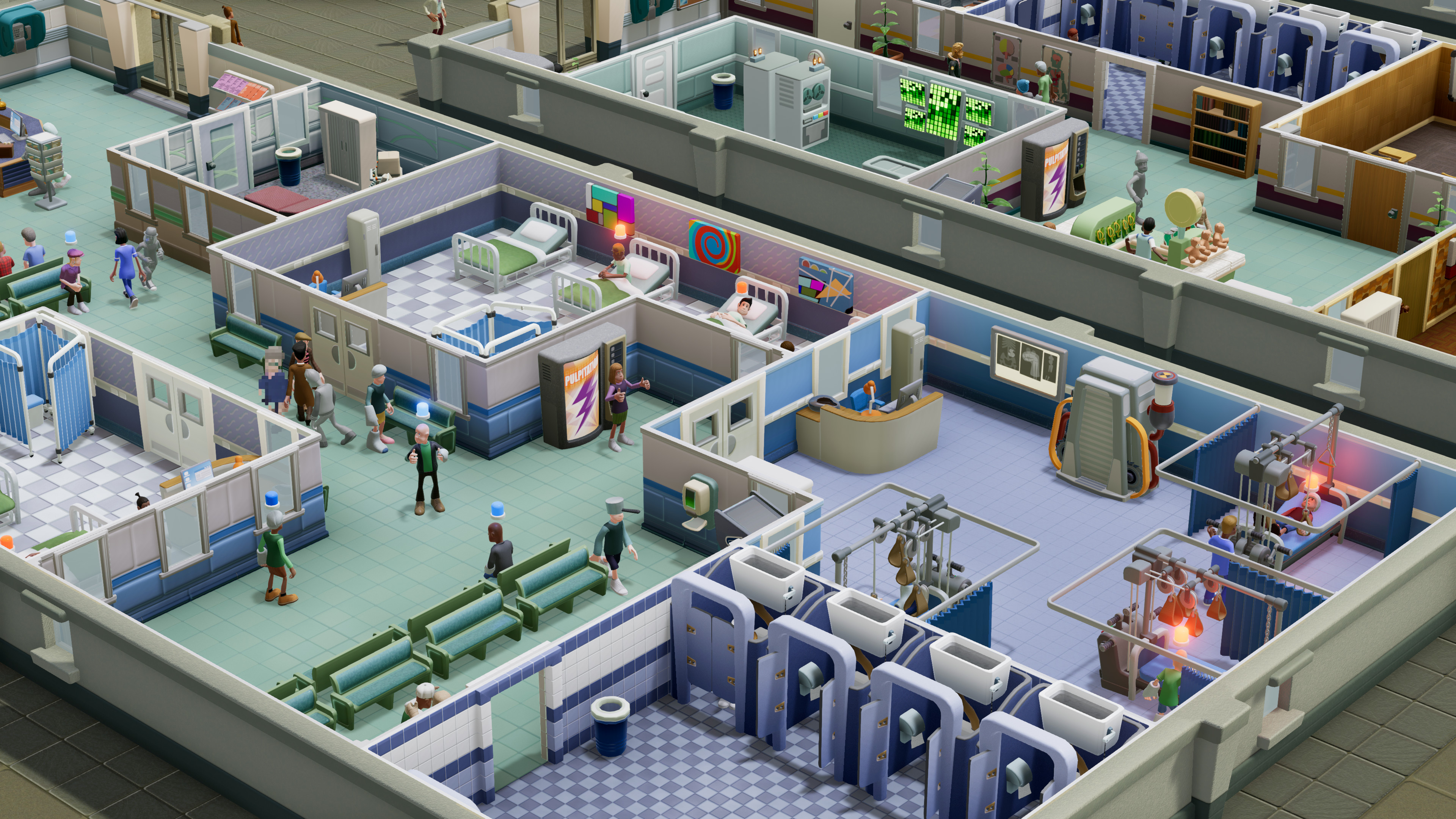
First office should have only very basic facilities. I assume 3 rooms: 1 bathroom, 1 small kitchen, and 1 office for 6 people (with only 5 desks). As part of tutorial, you will buy a new desk and hire a new supporter. But obviously that's not enough room if you need to get those 13 offices, let alone 666 contracts.
The 1st office has some pre-defined rooms (in terms of shape/size and placement), you can rent those specifically, and if you do – you can not modify their shape/size in anyway – only customize the insides. Alternative is to buy the whole floor, which would give you complete freedom and reduce upkeep cost per "square" (x2, perhaps, maybe possible to decrease it further). The downside of the purchase would be the need to hire at least 1 janitor and have a room for them and their utilities (otherwise the building's owner takes care of this). And, obviously, buying the whole floor is much more expensive.
The 1st office also allows you to buy another floor (or rent pre-defined offices there). Such a purchase should be part of the tutorial (possibly purchase of the floor specifically). You should be able to freely change floors, kind of like in Evil Genius 2 (do not know if original had the same feature). Buying floors like that is way cheaper than buying an office in a separate building, but to properly expand (and move towards the game's goal), we would need to do that, too.
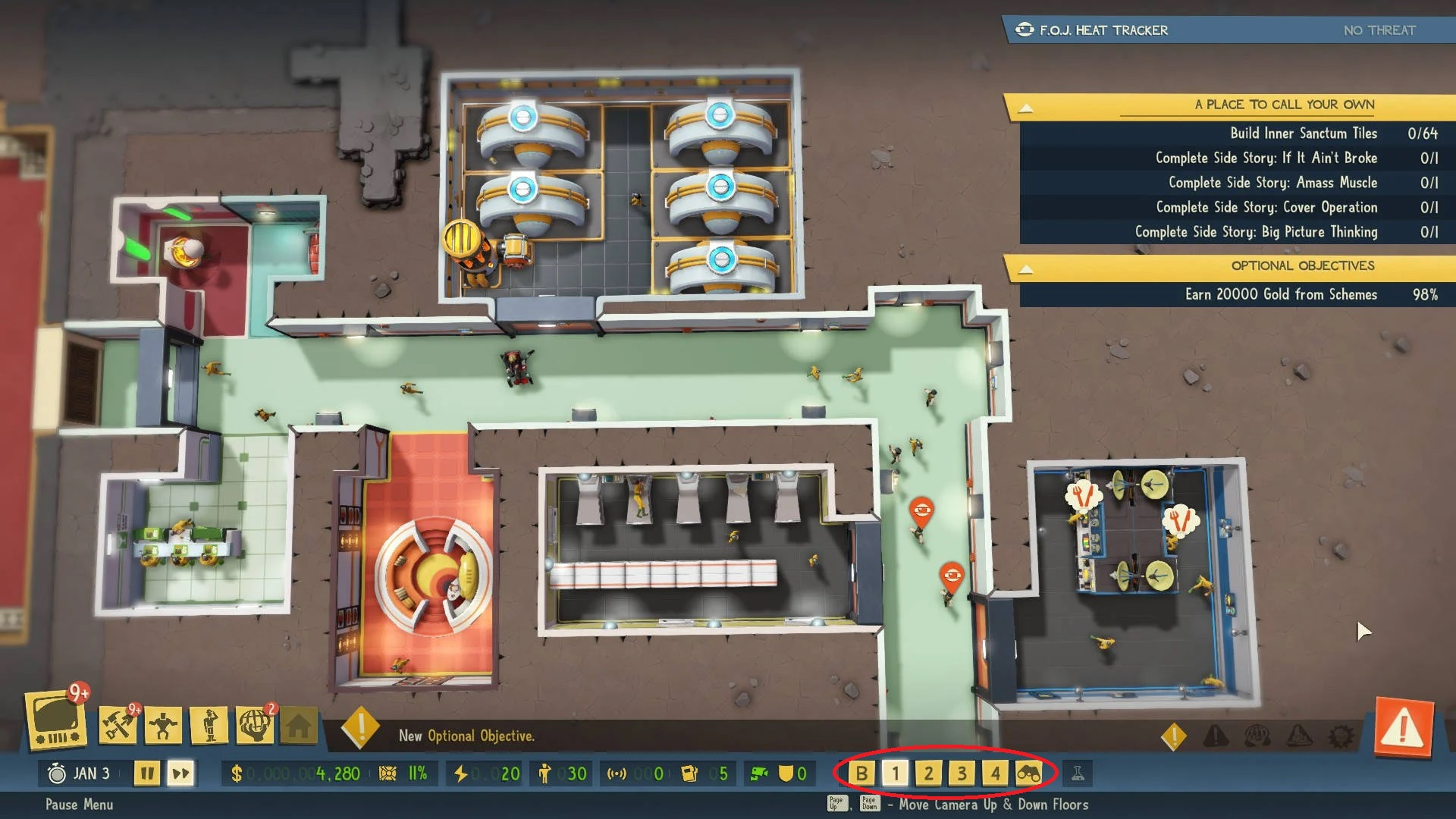
Now this is another important difference from TPH. Firstly, TPH had strictly predetermined maps for new hospitals. Secondly, when you moved to them, you kind of "forgot" everything that we had in the previous ones. I am suggesting that there is a generator of new office buildings available for purchase, which runs periodically to refresh the list. You can go to specific menu and choose one of them (possibly 2 or 3, no need for more), and when you make a purchase, you now can switch between maps.
This switching should work like mobile Frozen City. This means, that you not only can return to previous office and customize it, but that what you've created there will continue to function, while you are away (more on the "idle" mechanics later). In fact, depending on how you managed things in the previous offices, you may need to periodically return to them to check up on your employees (more on that later). Difference from "Frozen City" or similar idle games is that there is no "cost scaling" when moving between older and newer offices.
This means, that mid-game you can have 5 offices (obviously, you can name those), each may have more than 1 floor (I would probably limit it to 5 floors at most, maybe even 3). You can freely switch between them (seamless switching would be great, but probably too complicated, so loading screens between offices is totally fine), and resources of "non-active" offices will still count towards the resources you can use on the currently selected office.
In terms of types of rooms, there, probably, will be fewer of them. I can think of bathrooms, kitchens, meeting rooms, office rooms, server rooms, recreation rooms, maybe storage rooms.
The important thing for "office rooms" is ability to (optionally) assign employees to specific rooms and limit access to rooms (available to everyone, assigned personnel + open doors (non-assigned personnel can enter, but cannot work in the room, unless its maintenance fixing/cleaning stuff), assigned personnel + maintenance with free access, assigned personnel + restricted maintenance (can enter only if someone is present) and only assigned personnel). Such assignments should allow creation of both "specialized rooms" (janitors' rooms, HR rooms, call-center rooms, etc. or specialized for specific company) and personal rooms. This in turn can affect certain aspects of the game (more on that later).
It may also be a good idea to be able to "share" certain rooms between offices. For example, you can create a training room in one of the offices, which is used for trainings. If you need to train someone in the office, that does not have such a room, you can send that employee to another office, that has such a training room. I admit that it may be a bit complex from technical perspective, though.
People management
The game starts with 5 people, where 3 are purely support (that's a definite), 1 is an HR/Trainer (which is different from TPH, where you always hired people directly), and 1 is our "ex-CEO", who is a special character, who can do marketing (poorly) and support. I think having Levit as a character walking about could also be interesting, but not sure if he should be actively engaging in work.
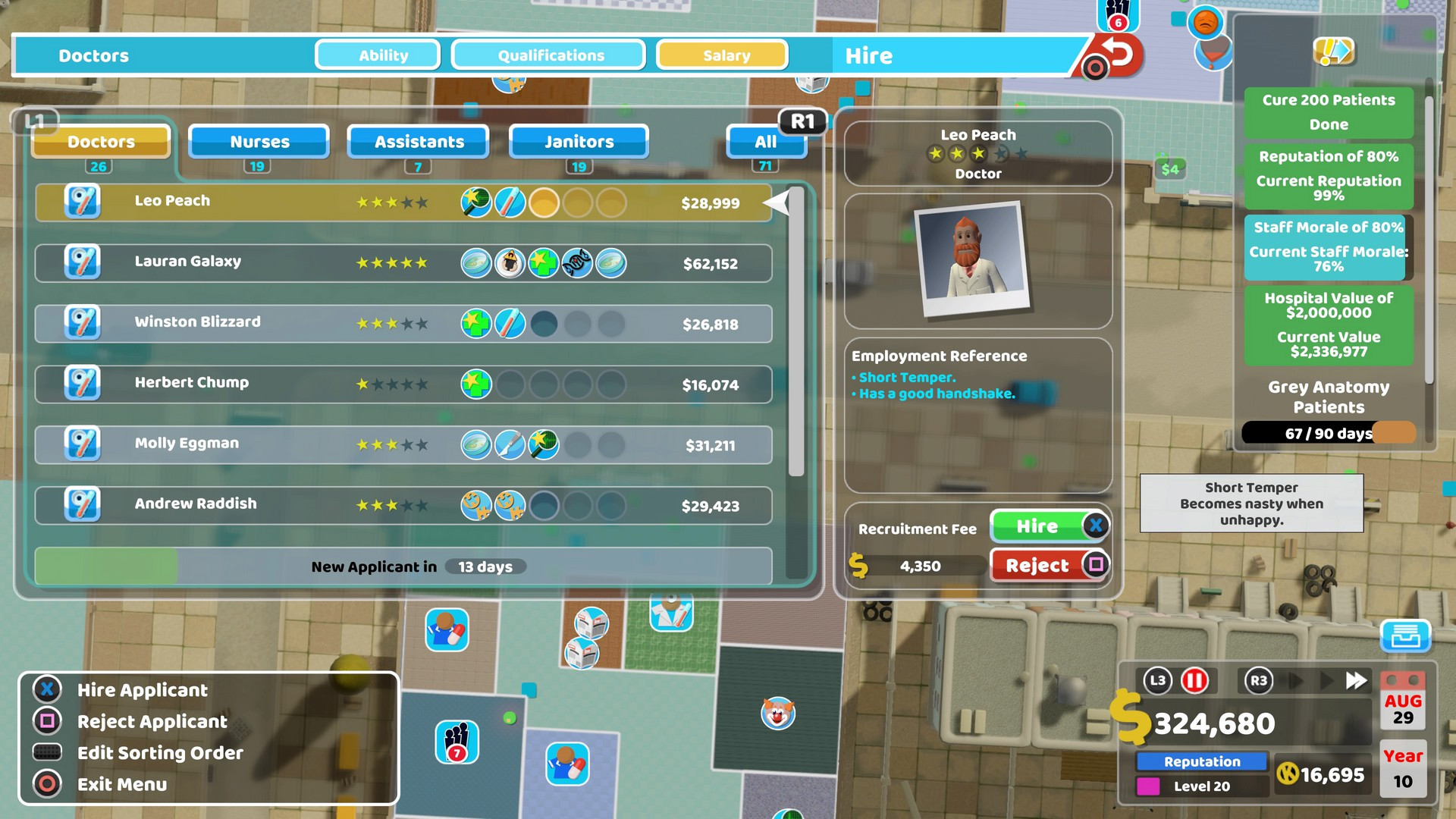
TPH had 4 types of hires (doctors, nurses, assistants, and janitors). We should have something similar:
- Specialists. This implies "tech" specialists, like tech supporters, testers, developers, etc. (these are more like "qualifications" in TPH). These people will be providing the services for our clients.
- Production. This covers project managers, business analysts, scrums masters, ISOs, marketing, etc. That is people responsible for processing of projects and their goals. They should be involved during client on-boarding or special "quests".
- Maintenance. This includes not only janitors, who keep things clean, but also TI guys ("Service Desk" only responsible for "supporting" our offices), DBAs, DevOps, etc. So, anyone making our Agency work as a well-oiled machine.
- HRs. A special category, and you should not have ability to hire anyone besides HR, unless you already have an HR specialist. In terms of qualifications, I think training, relocation, and benefits management need to be there, at least. Possibly "talent acquisition", so that they can proactively find potential hires (possibly as a chance to randomly generate suggestions to hire people at certain periods of time).
Managing the hires should be roughly the same as in TPH (including having some "perks" or "traits"), with main difference that under certain conditions (more on that later) you can cell employee's soul to Levit.
Also, I think TPH's "ability", which was represented as a 5-start system should be split into several metrics (more on them in B2B section), but not sure if those metrics should be shown "as is" in UI or should be converted into the same 5-stars metrics.
Idle earnings
One distinct feature from TPH is "idle mode". Or something like that. I am unsure whether it would be possible to create such a game on mobile due to controls, but even then, this is not mobile specific feature.
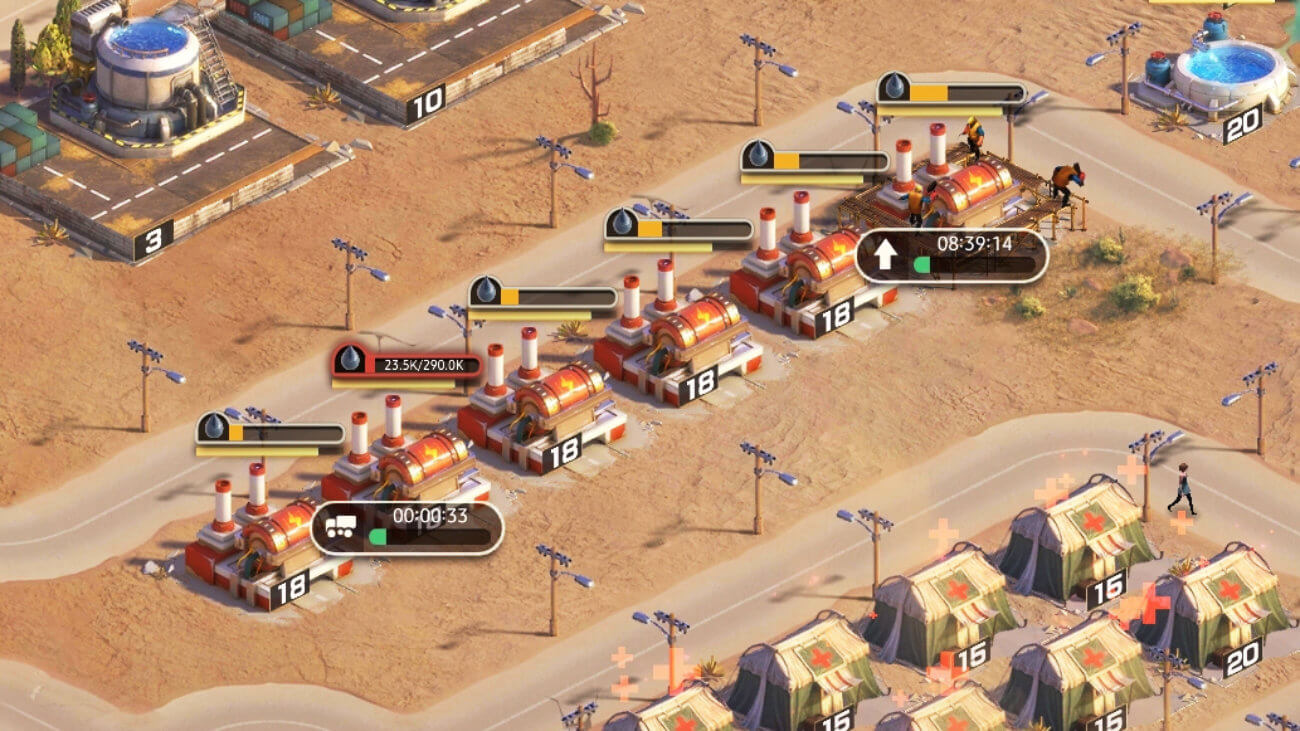
The point of the feature is to let processes established in the office "run" even when the game is not being played. We save the time of last activity on exiting the save and then check it against the time when the game is resumed and based on it, we add appropriate resources, like money. It should also "finish" some actions like trainings.
The same logic should be applied to our non-selected offices (that is those except the one we are currently managing on screen), with exception, that resources are collected automatically.
There would need to be some logic to protect from cheating through changing system clock, though. Perhaps, if the time difference is negative, then do the calculations and deduct respective resources, as if turning back time.
B2B
One major difference from TPH is that instead of "patients" we have "companies" (or "businesses", if you will), that do not come to us physically (at least not normally). We can search for companies using respective menus and accept/reject offers that would come from them if we have enough "fame".

Each company is generated similarly to TPH's patients or maybe even employees. It has a name, it has its own number of clients, number of applications (that we need to support), some requirements to type of support (levels of support (L0 to L4), channels (chat, email, phone, ticketing system, forum, social media), sum of money they are willing to pay depending on time period (daily, weekly, monthly, quarterly, annually, but always upfront) and/or number of closed incidents (emails, chats, calls, whatever). It also includes expected number of tickets in a time frame (perhaps per day?).
Once you select a company, negotiate the price, and sign a contract with them, you will need to assign specialists to support it (1 supporter can be assigned to multiple companies). The number is up to you, but it will affect efficiency and satisfaction of both employees and company's clients.
Speaking of satisfaction: it is one of the metrics, that company will be tracking. Regardless of an optional "upfront" payment, your periodic or per-incident compensation will depend on (roughly, will need refinement):
- Speed of initial response (SIR). This depends on respective parameter of all supporters assigned to a company (probably average value) and it gets worse under "stress". The smaller the value – the better, and the more expensive you can be.
- Politeness (POL). Depends on respective value of supporters. The higher – the better.
- Professionalism (PRO). Depends on "knowledge" (KNW) and "communication" (COM) parameters of a supporter. Ideally you want both to be roughly the same. If "knowledge" is much higher than "communication", then answers to clients are too complex, which can confuse them, but the reverse will result in longer resolution.
- Speed of resolution (SOR). That is how fast an incident is resolved. Depends on speed of initial response, knowledge, availability of "production" specialists.
- Overall satisfaction (SAT). Depends on whether problem was resolved or not as well as all the above metrics.
Each company will have expected "lowest" values of the above, if you drop below any of them for some reason, you may get fined. I would probably check the average drop in percent, then double it and take the same percent from the originally negotiated price. For example, you are 5% below every metric, with "professionalism" being 10% lower, it means  . So, you will need to refund them 12% for the respective period.
. So, you will need to refund them 12% for the respective period.
If you exceed them by certain percentage (10%+ perhaps?), then you get half of the average percentage as bonus. That is, if we exceeded all metrics by 10%, but "speed of initial response" by 15%, we get  .
.
Incident management
With all that said, a question comes to mind: how exactly are we to get those averages and what not? Obviously, we can't manage each incident (that is a communication with company's client), it would be too much micromanagement, so it will be a bit of randomization. Kind off. Here's what I have in mind.
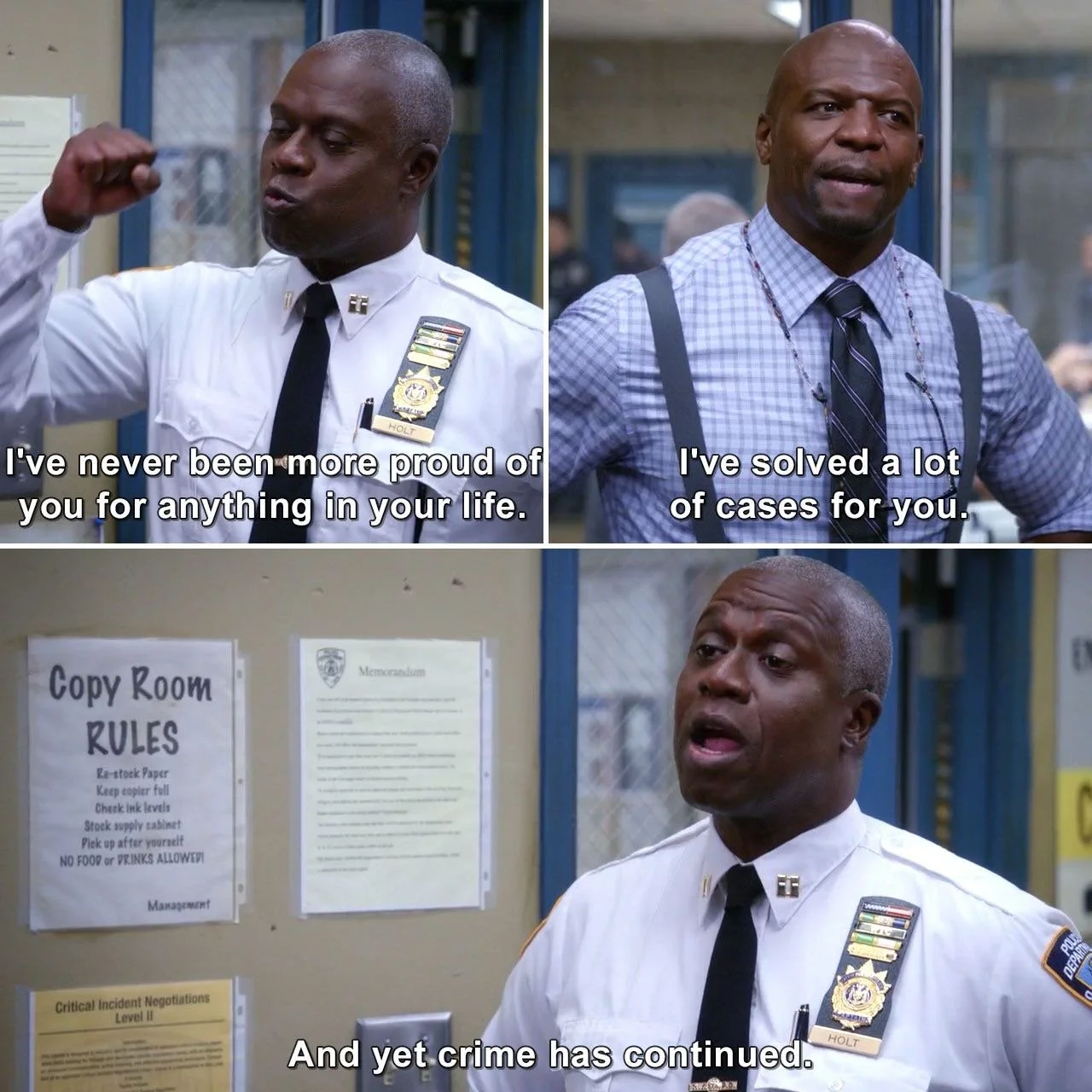
Depending on the company's expected number of new incidents per a time period (may vary, obviously), we convert that to new incidents per minute (and probably round it up). Once a minute elapses, we add the respective number to number of "active" incidents per company.
Each incident is "generated" with a difficulty rating from 1 to 100 for "the problem" (PRB) and "the client" (CLN), with higher numbers meaning higher difficulty. "The problem" difficulty determines the complexity of a problem. "The client" difficulty determines how "picky" the client is.
Each supporter also has a "capacity", that determines how many incidents (INC) they can handle at the same time. This affects how many incidents we can handle for the whole company. That is, if we have 5 supporters, each capable of handling 2 incidents, we can handle 10 active incidents (AIN) at the same time because total capacity (TCP).
As such I see formulas like these for metrics, monitored by companies (µ means respective average values calculated from all supporters assigned to a company, minutes are in in-game time):
 (the more incidents – the higher the value)
(the more incidents – the higher the value)
Examples:

 (the more incidents (stress) or the higher the difficulty – the lower the value)
(the more incidents (stress) or the higher the difficulty – the lower the value)
Examples:

 (equal values of KNW and COM are preferable than values with bigger discrepancies)
(equal values of KNW and COM are preferable than values with bigger discrepancies)
Examples:

 (higher levels of KNW in decrease speed of resolution more, COM is relevant only for internal communication, thus value is less critical)
(higher levels of KNW in decrease speed of resolution more, COM is relevant only for internal communication, thus value is less critical)
Examples:

 (POL and PRO are favored when they are close in values, the longer it took to resolve – the worse the rating)
(POL and PRO are favored when they are close in values, the longer it took to resolve – the worse the rating)
Examples:
Or something like this. I am pretty sure they would require refinement, but they can be a good start.
My real concern is with scalability, though, since we need 666 companies as a goal. Since adding an incident to the pool will not automatically resolve it, but rather start a countdown based on respective calculations, in a very simplistic case we can have 666 incidents created every 1 minute with each bulk hanging there for 2 minutes, which would result in possibility of 1332 incidents (and timers) at the same time. In a more complex situations, the numbers can be way larger even with fewer companies.
It's possible, that for scalability, the above formulas would need to be merged somehow, so that we calculate for the company as a whole, and not on per incident basis, but at the time of writing I can't think of a good way to do that.
Either way on the contract screen, you should be able to negotiate price and optional "clauses" (more on that later), which may improve the stats and thus make meeting the requirements easier. Negotiation success is affected by the "fame" score, which grows slowly with time when you have active contracts with companies (I think TPH had something similar). The higher the value and the less changes you suggest to the contract – the more likely it is, that the company will accept the altered terms. If you suggest and fail 3 times, though, the terms may get worse, so you need to be careful here. Although, it's not the only time you can try altering the contract (more on that later).
Rouge-lite
There are several places, where "rouge-lite" elements are present in the game:
- New hires, same as in TPH: names, gender, stats, specialties.
- Offices: size, form, placement of the pre-defined rooms (if any). Only exception should be the 1st office, and possibly some special ones. Pre-defined rooms can provide some "perks" as well, for example, an office may come with sauna (on one of the purchasable floors or in the building in general), which would provide recreation, improving efficiency of employees. I mean, the game starts in Finland, it must have a sauna.
- Companies: besides names, prices, and requirements/expectations for support, they also have perks, that should affect different stats.

What differs rouge-lite from rouge-like games though is the fact, that some perks/buffs "stick" through multiple playthroughs, right? In this game it will be done through "clauses", that are either issued within the agency (globally or per office) and with companies, with which you have a contract.
Each "clause" is one of the common practices, that you can find in the industry. To be able to activate one you will first need to "research" it, which would require a hire with "law degree" (probably either HR or Maintenance). Research is required, because you need to prepare a legal document describing the clause and then properly implement it.
For "clauses" for the agency I presume mostly simple stuff like shorter working day, 24/7 schedule with shifts, different salary bonuses, lunch vouchers, commute compensation, personal hardware, extra vacation days, etc. Basically, things that usually "improve" how employees feel about working for you. Those "clauses" can be toggled on and off once researched and be applied either to all offices or to specific ones.
"Clauses" for companies are a bit more complicated and interesting. They should be separated into color groups based on "teal organization" theory. Most of them will probably have both negative and positive effect. I assume that most of them would be related to overall structure of support group and communication with related teams.
Some of those "clauses" can be present (and that is active) when you sign a contract with a company, and those are like "traits". For example, a company can have a trait like "Utilitarian" or something like that, which implies very strict hierarchy, which will reduce KNW and POL, while improving SIR (significantly) and COM (probably marginally). Those "traits" cannot be deactivated at any point in time, they are out of your control. But you may be able to activate other "clauses" when signing the contract or once per in-game year after that. Those "clauses" can help with countering them. For example, we can implement some basic "Agile" methodology, which would increase KNW (because it implies knowledge sharing), but also slightly reduce COM (because of potential noise).
Company "clauses", unless they are "traits" can be toggled on and off, as well, but only during annual contract reviews. They are also applied per company only, but once applied they "stick", unless you decide to let the company go or the time-limited contract ends.
Some "clauses" (like the mentioned "Agile") should require "Production" hires with relevant skills.
Souls
I did mention that Levit is a demon, right? And his goal is to collect souls. Those who worked in Customer Support know, that the work can be quite stressful and at times, you may be ready to sell [a portion of] your soul to make things easier.

TPH had a concept of stress, and we can utilize it: the more "stressed" (or "angry") an employee is – the better it is for Levit, because once employee reaches a certain threshold, you can sell his/her soul to Levit. The "stress" should work the same way as in TPH, but also be affected by incidents' capacity: if the employee in support is working at full capacity, every minute of it should gradually increase their stress. Meaning, that if employee has capacity of 3 incidents, you will want them to handle no more than 2 incidents most of the time. This also means that employees with incident capacity of 1 are the most difficult to handle, because you will need to find a way for them to unwind.
Selling the soul will provide temporary boost to all the employee's stats (I would assume x2 boost, at least), but the employee will die in a few days (perhaps a week). Sounds like you may not really want that, but… There is a catch.
As mentioned before, you can switch between offices. When an office is not "current" one, not "selected", its stats drop. I do not think they should tank, like drop by 50%, but it should be something considerable to prompt the player to visit the office periodically, which give some "bonus" like "Liked by CEO" or "Demonic protection" or something, which negates this affect for some time.
As you can imagine, this reduction in stats may result in the office not meeting expectations of certain companies, and thus getting fined or losing the company all-together, which will still result in you losing profit, which you need to outfit the new offices.
The way to counter that is to hire demons as office managers. But to hire them, you need to sell employees' souls, that is you need to stress them out. If you hire the manager, they will prevent the debuff when you are "away" from the office. Number of souls to sell should depend on the number of employees in the company. Or maybe on number of managers already "hired": like start with 1 soul for 1st manager, then 5 for 2nd, then increase by 5 for each new manager.
Alternative to that is to organize the office and its workforce in a way, that will not be affecting your income that much. Losing a contract should not be seen as the end of the world, but to get to a point, where it's not – you will need to work pretty hard.
Obviously, this is part of the art of game balancing. I won't pretend I can even imagine all possible nuances there can be even with limited parameters that I've covered so far. Like there should be a challenge, but we should not make it in a way, that you must sell souls. In fact, there should be a possibility to achieve the goal without selling a single soul (perhaps except for one during tutorial). And that should have an achievement. As well as assigning X managers.
Quests
There is already a lot going on, but we do not want to abandon the story, that we've started. And we do want to provide some extra challenges during gameplay, as TPH does. I think this should be done through "quests".
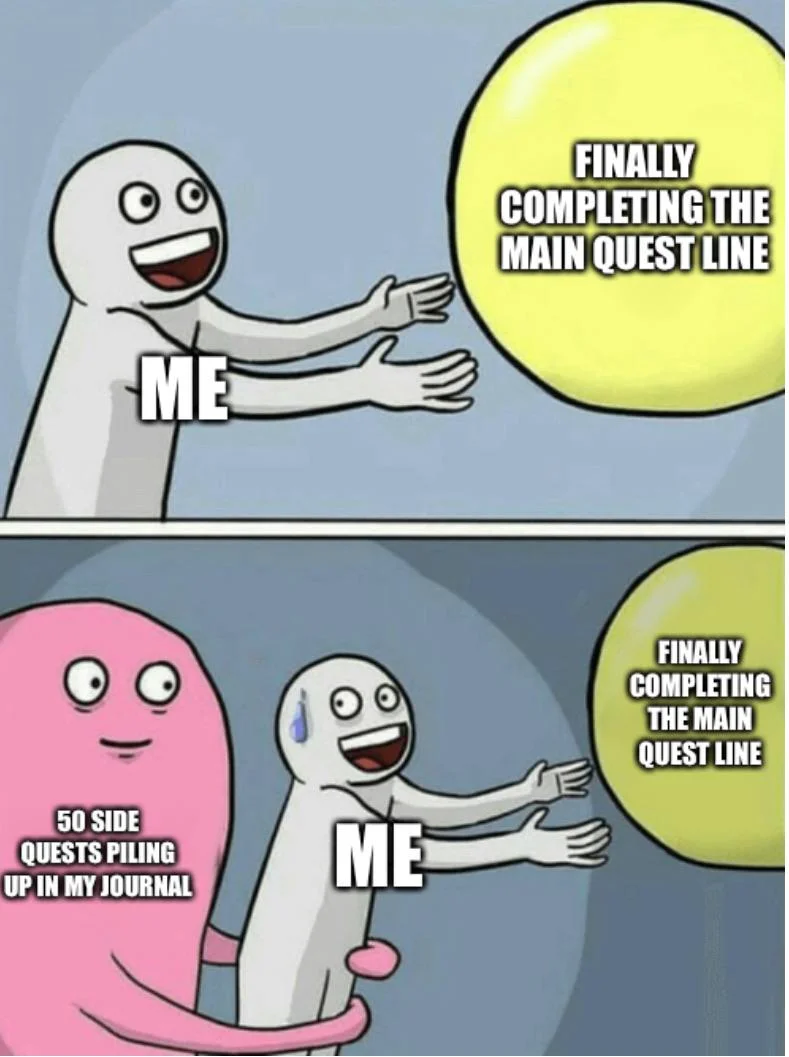
I think we should have "tailored" quests triggered when you have X offices and/or Y companies. There should be some "cutscene", through which we explain importance of certain common practices in Customer Support and show some "growth" of Levit. If any: he could forget about souls entirely, if by the end of the game, we did not "hire" any managers. There should also be quests, that are triggered randomly during regular gameplay. Those should be "generated".
Regardless of whether it's a "tailored" quest or generated one, I think they should be relatively simplistic ones:
- Earn X dollars in Y amount of time.
- Earn X fame in Y amount of time.
- Hire (or fire) X employees until the timer runs out.
- Research some "clause" within the time limit (can only happen if there is still something to research, obviously).
- A random challenging company appears, offers a time-limited contract, and you need to satisfy them (should give a huge boost to fame, if successful, or damage the fame, if not).
- A random "outage" event occurs in some company, that results in influx of incidents, with increase in CLN value for all of them (optionally increase in PRB, too), and you need to clear the queue in limited time and with certain SAT level.
- A representative of potential client comes to the office, and your office needs to be relatively clean and relatively polite all around, for them to suggest a contract for you (which you can refuse, and still get a small bonus of fame). May be nice to be able to assign either our "CEO" or Levit as an accompanying person. And if we assign Levit, we have a chance to sell the soul of the representative for a boost in profits from the suggested contract.
- Random one-time "projects" initiated by one of your clients, which simply require some specific "Production" specialists to be available for a certain period of time. These could be "security assessment", "process automation", "disaster recovery test", "application refactoring" and the like. Possible, that some quests of this type will add a "trait" to respective company, if successful.
- If we had any souls sold – random police investigations. If we have assigned managers, we need to somehow hide them (drag them to different rooms, perhaps?), so that police would not see them.


